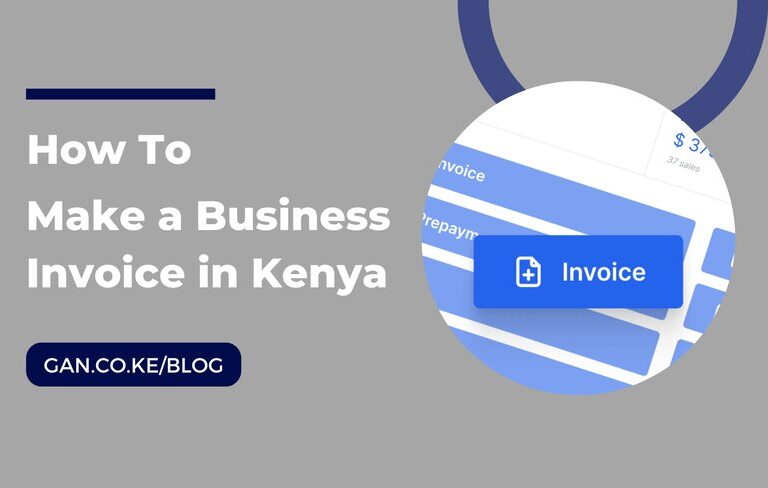
What is An Online Business?
An online business is a business that sells physical goods, services, informational products, or software only online. This type of business does not require physical contact with customers to complete sales transactions; it can be an e-commerce store selling several products, a service business selling packages, or a software as a service (SaaS) business selling plans with varying levels of access. In all of these cases, customers pay for their purchases or subscriptions directly on the website.
How to Start An Online Business in Kenya
By starting your online business via a tried-and-true method, you increase your chances of success. Before you launch, you need to confirm your idea, research the competitors, and determine how much it will cost.
Therefore, the following are the steps for launching an internet business in Kenya:
Step 1: Decide what you are going to sell.

Ideas for successful businesses are those that provide answers to issues that many people are encountering, which lead to the need for particular fixes.
Finding issues that you can resolve with your current knowledge or abilities is your task.
The majority of internet retailers resell tangible products they purchase from vendors. Finding things that people are likely to purchase online is essential if you’re going this route.
The things you intend to offer online must have a high potential for profit for this to be a profitable venture.
You can sell services like virtual help or content writing, but your earnings may be restricted by the number of hours you can work. You will make more money selling handmade and crafted goods than reselling products that already have a large number of sellers.
Step 2: Conduct market research
Don’t assume that your goods or services already have a market.
Even if it does, you must make sure there is room for another person. The possible sales amount is determined by the market’s size.
Doing market research on a novel new product will determine whether the market is prepared for it. You have to educate the market before launching numerous new products. Eventually, some products that appear to be successes will turn out to have poor product-market fit.
- Surveying the people who are most likely to purchase your items will yield data that is pertinent to the business you plan to launch. Accordingly, you must first determine who your target clients are.
- Customizing your products and marketing messages will be made easier if you are aware of the interests, problems, and preferences of your potential clients.
- Before launching your internet business, you should decide whether there are already companies providing comparable goods or services.
- Over time, will there be a rise or fall in demand for this product?
- Is making a profit going to be challenging?
- Which major issue does your product or service address?
- Would individuals be prepared to pay money to address this issue?
Step 3: Write a business plan
A business plan is a tactical instrument that helps you at every step of launching and running your company. Planning for your company’s growth is another benefit. To raise money, you can also share it with possible investors.
Writing a business plan helps you discover possible dangers that could affect your company’s survival because it requires you to perform a SWOT analysis.
Developing a company plan doesn’t require extensive knowledge. Some services offer business blueprints for typical companies. Additionally, a free template can be downloaded from the internet and altered to suit your requirements.
Step 4: Calculate startup costs
Even if beginning an online business in Kenya is less expensive than launching many physical firms, there are still costs involved. Therefore, you must determine your start-up costs, whether you plan to start the business with your money or with the help of investors. You also need to know how much it costs to manage your business.
Online firms must pay for branding, website design and hosting, licenses and permissions, and other startup expenses. Startup costs for a service-based business like freelance writing include things like computer equipment and internet.
Step 5: Choose your name and register your business

A crucial first step in starting an internet business is deciding on a name. Customers will recognize you by your company name. It aids in setting your company apart from rivals.
Although your company name should be distinctive and memorable, it shouldn’t violate any already-existing trademarks. You’ll use the same name to identify yourself on social media and on your website, which will serve as the main location for your business.
When you register your business, you will officially establish your company and secure your business name. To legally register your company online, go to the eCitizen portal. Keep in mind that you must register an internet business in the same manner as you would an offline one.
When you register a business, you will be responsible for paying any taxes due to KRA.
In Kenya, you have the option of registering your company as a sole proprietorship or as a corporation with directors and shareholders.
Although there is a wealth of information available online regarding the business formation procedure, you may also seek assistance from attorneys and accountants. Experts in legal compliance and business formation are also available for consultation.
Step 6: Brand your business
A company like Nike or Coca-Cola can be easily recognized by its logo or brand colors. Consumers must be able to quickly identify your company on a variety of marketing channels.
Developing visual assets, such as a logo, color palette, and even typography, may be necessary to establish a brand identity. To strengthen their identification, businesses also employ other brand assets, including catchphrases, distinctive packaging, and noises.
You can come up with additional distinctive features that make your company stand out as you develop a brand that people adore. Do you care about the environment? Do you contribute to your community?
Additionally, a brand may be distinct in the individuals it aims to connect with.
Maintaining a consistent branding strategy across your website and social media accounts is also essential. For example, your social media cover photo ought to resemble other images on your website.
Custom logo design services are available at any printing company. Experts in branding can also be hired via freelance networks.
Step 7: Create a website and social media channels
Customers must be able to locate you online with ease if your firm is online. You cannot make sales if they are unable to.
Google traffic is the main source of leads for the majority of internet businesses. Therefore, you will need to tailor the content of your website around keywords that are pertinent to your company. By doing this, Google can direct clients to your company’s website.
To have the website made for you, you can engage a web designer or agency. The best way to have a website that looks professional is to do this.
- To create a website, you don’t have to hire a developer. But you have to be tech-savvy. The following are the actions to take:
- Find a partner for hosting;
- Reserve a domain name;
- Choose a hosting package according to your needs and financial constraints.
- Choose the website builder of your choice. Most websites are powered by WordPress. For e-commerce websites that need product displays, the WooCommerce extension is helpful. Aside from WordPress, Shopify and BigCommerce are two of the best e-commerce content management systems on the market.
- Make your website’s main pages, such as the home, about us, and price pages.
After you have a website, keep going. You can start an SEO campaign that involves writing informative blogs that rank for common search terms on Google.
A link to your sales page or a recommendation for your services might be included in the article you write.
Your social media accounts might also help people find your internet business. You must therefore have a strong social media presence. Similar to your website, you must produce and distribute high-quality, useful content to draw clients to your online store via social media.
Step 8: Select an online payment processor
Creating a seamless experience for clients from the moment they arrive on your website until they check out is essential when selling online. You don’t get the sale unless they check out successfully.
Therefore, you need to make it simple for clients to pay. Consumers require a variety of payment methods so they can try another one if the first one doesn’t work. You have a better chance of converting every potential customer when there are multiple payment options.
You can sign up for an M-PESA PayBill or Till Number to expand your payment choices. However, as your online store expands, manually processing orders can become very tiresome.
For a seamless checkout procedure, it is important to have a shopping cart that is integrated with a payment processor. Some of your clients will use credit cards like MasterCard and VISA to make payments. You’ll need to figure out how to handle their payments.
IntaSend is Kenya’s online business payment processor. Accepting payments on your website is made possible by the payment gateway. In a safe setting, customers can pay with credit cards or mobile wallets.
You can effortlessly keep tabs on your account in real time and track every transaction with IntaSend. You can still safely receive payments with IntaSend if your business caters to clients around the world. Bitcoin or credit cards can be used by customers to make payments.
Step 9: Launch the business and serve your first 10 customers
You can consider your first customer as the official launch of the business. Until you have enough sales to at least cover your costs, you are not going to be doing any festivities to launch your business.
To kickstart the business, consider a sales promotion. A press release and some posts on social media announcing the launch also give the business some early traction.
Once your business is live, you need to build momentum. There is no better way to do this than setting an initial target to serve at least ten customers, or 100, depending on your scale.
Running an online business will not necessarily be easy. You need to devote yourself to making the business a success. You are going to be working your socks off for a while because you see signs of success.
Step 10: Build your brand’s visibility and reputation
Your internet business won’t become successful right away. You’ll need to put plans in place to expand it. This can entail utilizing SEO to boost website traffic. It may also entail deploying display and social media advertisements to raise your internet presence.
Sponsored posts or paid ads are two tactics that Kenyan internet companies frequently employ to advertise on social media. It’s reasonably priced when compared to other online advertising options.
For seven to ten days, you can even run an advertisement on Facebook and Instagram with a meager 1,000 KES expense. Simply establish spending limitations and target a particular audience.
99% of consumers check reviews before making an online purchase. Therefore, requesting feedback from clients once they have finished their transactions will encourage others to make purchases.
Showing clients the backend of things is another way to gain their trust. Shops that import clothing from Turkey could post pictures from their international business trip or display new inventory that has arrived.






